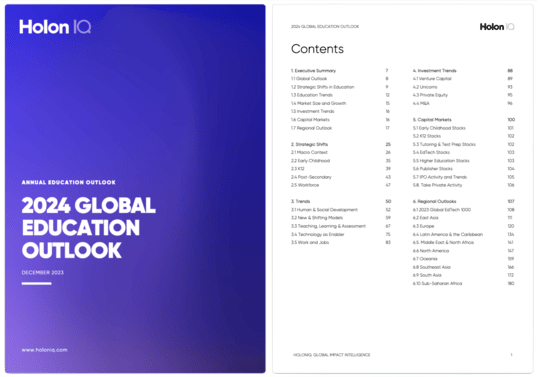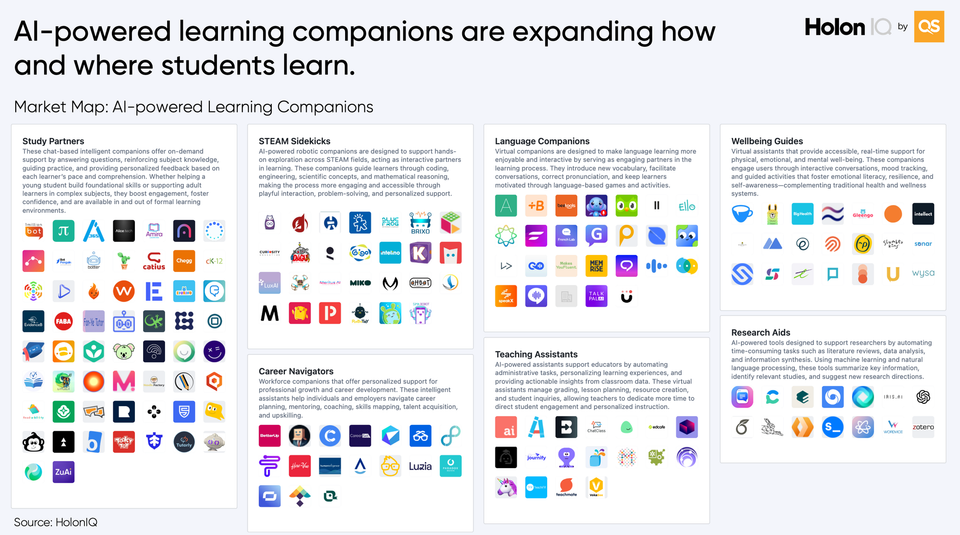🪂 Powering Student Retention + Women in Education
Implementing retention and success solutions requires personalized support, early intervention, and holistic engagement. Utilizing data analytics can identify at-risk students, enabling institutions to address academic, social, and emotional needs effectively.
Happy Monday 👋
Student retention and success is a critical metric for higher education, yet a considerable number of students leave higher education before completing their degree, prompting universities to making use of a range of targeted solutions, technology and data to support students through to graduation and beyond.
This Week's Topics
- 🪂 Student Retention and Success. Mapping 160+ global players aiming to support students to graduation and beyond
- 📊 Chart Spotlight. A quarter of US college students didn't return for their second year in 2021
- 🙎♀️ The Global State of Women's Leadership. Check out our annual data on the global state of women's leadership
- 📖 Annual Education Outlook. 180+ pages of trends, insights, and data
- 💰 Education Deals of the Week. Funding, M&A and grants
Don't forget to check out The 2024 Global State of Women's Leadership, published earlier this month, to find deep benchmarks on Women Leaders in Climate Tech, EdTech, HealthTech, and more.
Sign up for our new Daily Newsletters, Chart of the Day and Impact Capital Markets. For unlimited access to over one million charts, request a demo.
🪂 Student Retention and Success Market Landscape
Student retention and success are critical metrics for higher education institutions. Yet, each year, a significant number of students globally leave institutions without completing their degree, costing billions of dollars annually. Key challenges to retaining students include both academic and non-academic pressures, such as financial constraints and personal stress, prompting universities to seek ways to better support their students.
Technology-enabled solutions are aiding students' retention and persistence across a number of fronts. In addition to university-provided services such as academic staff and learning units, digital tools and services play a large part in helping students succeed in higher education, offering targeted coaching, mentoring services, and tailored guidance for academic challenges. For non-academic support, there is an increasing acknowledgment that providing pastoral care to students, particularly after the pandemic, is essential for cultivating engagement and success. Universities are increasingly drawing on services that provide analytics to track students' progress, such as financial aid support, counseling services, and well-being programs. Finally, career readiness remains a top priority for students, faculty, and administrators, yet many institutions struggle in this area. Services to universities in career readiness have grown over the last number of years, with solutions helping guide students through skill assessments, job placement, CV preparation, and interview preparation. These services increasingly work with universities to help students transition into professional life.
🪂 Student Retention and Success - Market Map

📊 Charts Spotlight - A Quarter of US College Students Didn't Return for their Second Year in 2021
Subscribe to HolonIQ's 'Chart of the Day,' a daily newsletter that helps explain the global impact economy, from climate tech to education and healthcare.

In 2021, 24% of first-year US college students did not return for their second year. The overall persistence rate for the 2021 beginning cohort was 76%, consisting of a retention rate of 67% for students returning to the same institutions and 9% of transfer-out students continuing their second year in another institution. As colleges face demographic shifts, maintaining student enrollment and progression becomes crucial.
🙎♀️ The 2024 Global State of Women's Leadership
Each year, HolonIQ takes stock of the global state of women's leadership. The landscape of EdTech paints a picture of the underrepresentation of women leaders despite the majority of teachers and educators being female. Examining the 1000 most promising EdTech startups globally, which HolonIQ identifies each year, the data reveals that positive trends are slowly emerging, signifying a growing presence of women in shaping the future of educational technology. The share of women CEOs in HolonIQ's EdTech 1000 has inched upwards from 13% (2021) to 16% (2022) and 17% in 2023.

📖 2024 Global Education Outlook
HolonIQ's annual analysis of the global education economy offers over 180 pages of in-depth insights on market data, investments, strategic shifts, and trends in education. Download the extract or purchase the full report.

💰 Education Deals of the Week
HolonIQ actively monitors and tracks funding flows in the education market, spanning across all regions and transaction categories. Subscribe to our Daily Capital Markets newsletter to catch the top deals for each day.
Funding
🧑💼 Learnovate Centre secures $10.4 million to help Irish companies address emerging skills gaps and prepare for the future of work.
M&A
🤗 UpLift, a behavioral health company, has acquired TAO Connect, a mental health company for university students.
✍️ Academic publisher Taylor & Francis acquired PeerJ, an open-access journal platform, to expand its offering to researchers and extend into new disciplines.
University Grants
🇺🇸 Yale University pledged $10 million to HBCUs over five years with the ASCEND Initiative for research partnerships, faculty resources, and student access, aiming to deepen collaboration and address historical ties to slavery.
🇮🇳 The Indian Institute of Technology (IIT) Hyderabad secured a $7.2 million federal grant to establish a new center focused on fundamental and industrial R&D purposes.
🇺🇸 City University of New York has received $2 million in state grants to expand opportunities for students through paid apprenticeships with employers, including Bloomberg and Northwell Health.
🇺🇸 The University of Texas at Arlington received a $1.25 million federal grant to support future special education teachers, covering tuition and expenses for six students annually over five years, combating longstanding shortages in the state.
🇨🇦 Langara College has secured a two-year, $350,000 federal grant to sustain its skills training program for women of color.
🇺🇸 The Lumina Foundation is providing funding to seven state and university systems to revamp their admissions processes amid uncertainties surrounding standardized testing, FAFSA, and the Supreme Court’s ban on race-based admissions.
Thank you for reading. Have a great week ahead!
Have some feedback or want to sponsor this newsletter? Let us know at hello@holoniq.com

